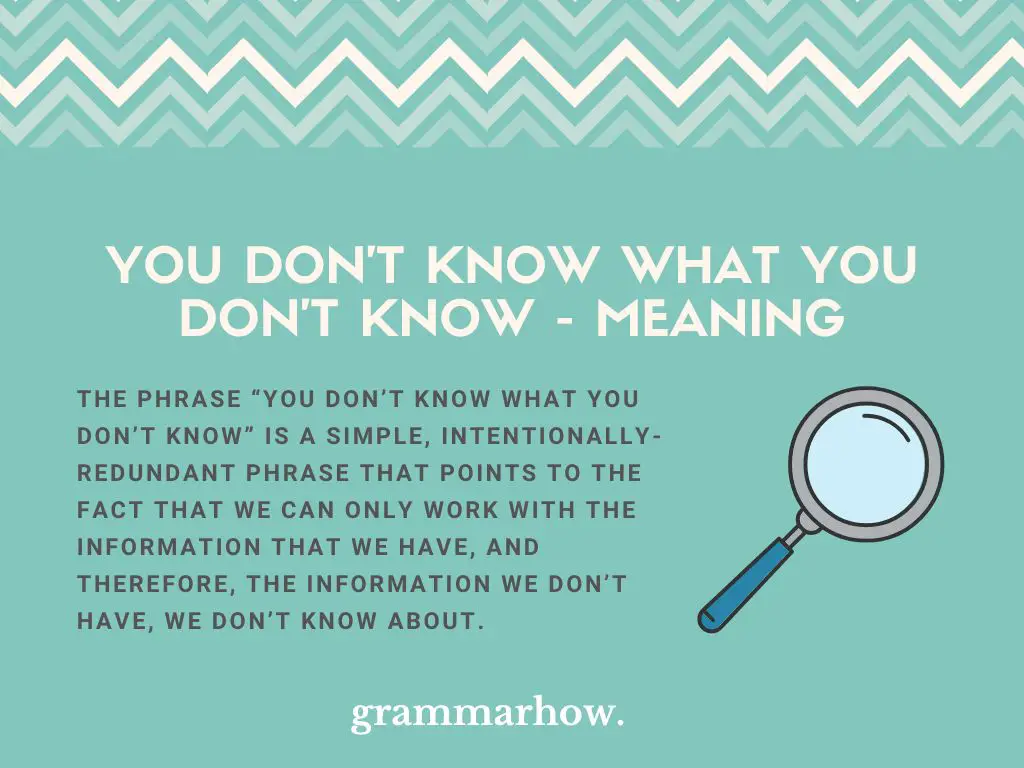You might’ve seen the phrase “you don’t know what you don’t know” in the past and been unsure as to what it means. This article is going to fully explain what “you don’t know what you don’t know” means and how you can use it in your own sentences.
You Don’t Know What You Don’t Know – Meaning
The phrase “you don’t know what you don’t know” is a simple, intentionally-redundant phrase that points to the fact that we can only work with the information that we have, and therefore, the information we don’t have, we don’t know about.

This is very much a phrase that relates to broad philosophical notions about the knowledge that we have and the way that we’re unable to simply conjure up knowledge from nothing.
By explaining that you don’t know what you don’t know, you’re justifying the fact that you lack information by explaining that fact in a broad manner.
How to Use “You Don’t Know What You Don’t Know” in a Sentence
There are actually many ways in which you can easily incorporate “you don’t know what you don’t know” into a sentence without any issues. Here we’ve collected some example sentences to really help you memorize how to use “you don’t know what you don’t know” properly:
- You don’t know what you don’t know until you know it, my friend.
- You don’t know what you don’t know, because that’s how knowledge works.
- You couldn’t know beforehand, because you don’t know what you don’t know.
- Because you don’t know what you don’t know, it was unreasonable to expect you to know.
- You don’t know what you don’t know, and in this case you now know what you didn’t know before.
- You don’t know what you don’t know, but after this class you will know what you didn’t before.
- You don’t know what you don’t know so I think you should try to learn what you don’t know.
You Don’t Know What You Don’t Know – Origin
“You don’t know what you don’t know” is a modernized, catchier version of the classic philosophy quote stated by Socrates, which goes: “I only know that I know nothing”. These two phrases express the same sentiment, except the more modern phrase is somewhat more ironic and humorous.
The phrase seems similar to the things that baseball player Yogi Berra used to say. He enjoyed tautological sayings, such as “it’s not over until it’s over” and “you can observe a lot by watching”.
When we say that something is “tautological”, it means that it’s redundant in an intentional way. “You don’t know what you don’t know” is tautological.
You Don’t Know What You Don’t Know – Synonyms
There are several phrases in the English language that you could reasonably use to convey the same message expressed by “you don’t know what you don’t know”. Here are some of these synonym phrases that work as alternatives to “you don’t know what you don’t know”:
- I only know that I know nothing
- You couldn’t know what you didn’t know.
- He didn’t know because he didn’t know.
- I can’t know what I didn’t know.
Incorrect Ways to Use “You Don’t Know What You Don’t Know”
There are actually several incorrect ways to use “you don’t know what you don’t know”. The main incorrect way to use this phrase is when people use it to talk about something that they did know, but forgot about. This is an obviously incorrect use of the expression.
Because “you don’t know what you don’t know” talks exclusively about information that you had no way of knowing before, and simply wasn’t in your head, it doesn’t apply to things you knew but forgot.
In What Situations Can You Use “You Don’t Know What You Don’t Know”?
You can use “you don’t know what you don’t know” in any situation where someone is lamenting the fact that they didn’t know something, and it’s information that they couldn’t reasonably have known before the fact. The key lies in the fact that this is information they couldn’t have known.
If someone complains about going to work only to find that there had been a gas leak and they couldn’t enter the building, you could use the phrase, as no one warned them about it.

Martin holds a Master’s degree in Finance and International Business. He has six years of experience in professional communication with clients, executives, and colleagues. Furthermore, he has teaching experience from Aarhus University. Martin has been featured as an expert in communication and teaching on Forbes and Shopify. Read more about Martin here.
